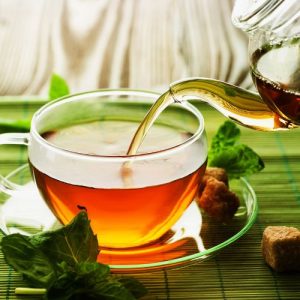As a certified health coach, I have always emphasized the importance of gut health in my teachings. Through my professional insights and personal experiences, I have come to understand the delicate balance of our digestive system. Today, let’s delve into the world of herbal teas and explore their potential benefits for gut health.
Exploring the Benefits of Herbal Teas for Gut Health
Tea isn’t just a comforting beverage; it’s a healing elixir. As we navigate the intricate world of herbal infusions, we uncover the potent benefits each brew offers for our digestive well-being. From the soothing touch of chamomile to the invigorating essence of peppermint, let’s embark on a journey to discover the transformative power of nature’s finest herbs for gut health.
Peppermint Tea:
- Benefits: Peppermint tea is known for its ability to relieve digestive discomforts such as gas, bloating, and indigestion. It has a calming effect on the digestive tract and can reduce pain. Research suggests that peppermint oil can significantly reduce symptoms of irritable bowel syndrome (IBS).
- Availability: This tea, made from peppermint leaves rich in essential oils like menthol, is widely accessible and naturally caffeine-free. For those looking to try a variety of teas, consider this Sample Tea Kit, which includes Peppermint tea, among others.
Ginger:
- Benefits: Ginger is highly regarded for its anti-inflammatory properties and its ability to enhance digestion. It is also known to alleviate nausea.
- Availability: Ginger tea can be brewed using fresh ginger slices or can be found in tea bags.
Slippery Elm:
- Benefits: Slippery Elm is believed to soothe the stomach and intestinal lining, reducing inflammation.
- Availability: Often available in powdered form, it can be mixed with water to make tea.
 Chamomile Tea:
Chamomile Tea:
- Benefits: Chamomile is famous for its calming effects, which can help reduce stress, a known irritant to the gut. It also possesses anti-inflammatory properties.
- Availability: Chamomile tea is widely available in tea bags or loose flower form. If you’re new to brewing loose-leaf teas, the Tea Infuser Set by Chefast is a great starting point.
Turmeric:
- Benefits: Curcumin, the active component of turmeric, has powerful anti-inflammatory and antioxidant properties. It has been studied for its potential to reduce inflammation and provide other health benefits.
- Availability: Turmeric tea, also known as “golden milk,” is made by simmering turmeric with milk and various spices. To brew a perfect cup, consider using the Glass Teapot with Infuser by Hiware.
Fennel:
- Benefits: Fennel is known to help with bloating and gas and has a calming effect on the digestive tract.
- Availability: Fennel tea can be made by steeping crushed fennel seeds in hot water.
Marshmallow Root:
- Benefits: Marshmallow root is believed to soothe the lining of the stomach and intestines.
- Availability: It’s available in tea form, often combined with other herbs.
Dandelion Root Tea:
- Benefits: Dandelion root is believed to aid digestion and act as a mild diuretic.
- Availability: Dandelion root tea is available in many health food stores.
Aloe Vera:
- Benefits: Aloe Vera is known to soothe the stomach and intestines, reducing inflammation.
- Availability: Aloe Vera juice is available in many health food stores. It’s important to choose a product made for internal use.
Licorice Root:
- Benefits: Licorice root is believed to soothe the stomach and intestines.
- Availability: Licorice root tea is available in many stores, but it’s essential to choose deglycyrrhizinated licorice (DGL) to avoid potential side effects. For those who prefer brewing with tea infusers, the Yoassi Extra Fine 18/8 Stainless Steel Tea Infuser is a top-rated choice.
A Personal Note
Navigating the world of herbal teas with personal health conditions and sensitivities adds another layer to the journey. For instance, while many swear by the benefits of Aloe Vera and Dandelion Root Tea, my unique health quirks mean I have to approach them with caution. After much exploration, I’ve found solace in Chamomile Tea for its calming effects and Licorice Root (specifically DGL) for its soothing properties.
But here’s the thing: our bodies are unique. What works wonders for one person might not for another. For example, while Peppermint Tea is a favorite for many, it might not be the best choice for someone with a hiatal hernia, as it can relax the lower esophageal sphincter. It’s these nuances and personal experiences that remind us of the importance of individualized care.
Sharing this isn’t just about my story; it’s a reminder that our paths to wellness are deeply personal. It’s about finding what resonates with our bodies, understanding our sensitivities, and making informed choices.
In Conclusion
The path to optimal gut health is as diverse as the herbal teas that can support it. As we sip our way through these natural elixirs, it’s essential to stay informed, consult professionals, and always prioritize our well-being.
Engage with Us
We’d love to hear from you! Have you tried any of these herbal teas? Which ones worked best for you? Share your experiences in the comments below, and let’s create a community of tea lovers and wellness enthusiasts!
Disclaimer: The insights shared here are a blend of research, professional knowledge, and personal experience. Always consult with a healthcare professional before making any changes to your health regimen.


